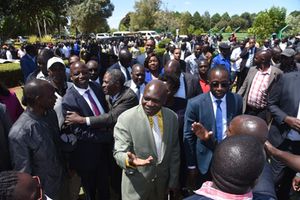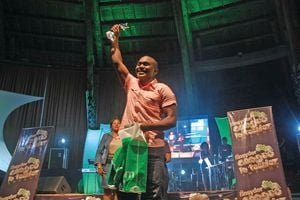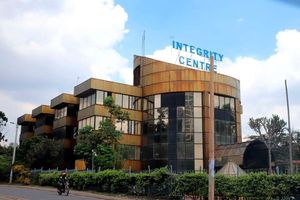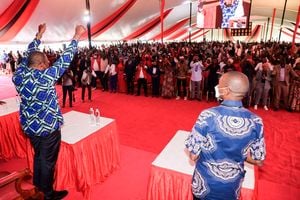
The entrance to Moi University's main campus in Kesses, Uasin Gishu County on February 8, 2024.
A couple of days ago, the vice-chancellor of Moi University performed his office of proclaiming, by way of an internal memorandum addressed to all students, that a special meeting of the senate had approved the resumption of the disrupted 2024/2025 academic calendar, with immediate effect.
On Monday, therefore, students are expected to have reported back and present in class at 8am without fail.
Far from representing a novel chapter in the chronicle of this troubled university, this news merely records a reprieve purchased through a government rescue operation.
In other words, the resumption of the academic calendar does not guarantee that 2024/2025 will be accomplished in 2024/2024, and neither does it inaugurate a bold departure from a history that is flagrantly mottled with acts and omissions consequent to oblivious misconduct, which incrementally drove a highly promising and refreshingly innovative institution to the cusp of perpetual existential precarity.
Although it is extremely fashionable now to profile Moi University as a utensil of the Kalenjin and attribute the myriad vexations complicating its malaise to tribalism, such an attitude is both inaccurate and self-incriminating.
By and large, Moi University is the miserable victim of a series of unfortunate circumstances, a number of which fell beyond its control. By the time the McKay Commission was completed, leading to the promulgation of the Moi University Act, 1984, Kenya was in the grip of a torrid political fever, on account of vicious contestation following the horrors of the 1982 coup, an insurrection whose impact continues to reverberate in our body politic.
The coup was the first major explosion of political conflicts which were heavily infused with distilled ethnic rancour. There is no bigotry more malignant than the subtle appeals cloaked in alluring moral and intellectual finery, plied in the sleek accents and insidious sophistry of the enlightened.
It is incontrovertible historical truth that in response to the coup, Moi's presidency acquired a vicious, repressive flavour. Equally incontestable, is that such reactionary manifestations of state power radicalised the Moi-skeptics of the change-the-constitution and ‘passing cloud' infamy, as well as a long-marginalised constituency that had been disillusioned with the first Kenyatta, who were disenchanted with Moi's obduracy in hewing to his predecessor's ways by dint of the Nyayo philosophy.
The resultant negative feedback loop implicated the nation's intellectual community , effectively turning everyone who had experienced any degree of higher education into an opponent of Nyayo and enemy of the state.
In this state of affairs, it would have been recklessly ambitious to expect that matters would go well for Moi and his policies.
As a matter of fact, all Nyayo state projects began to be profiled as stealthy schemes to entrench tyrann, while everything about Moi, the man, was characterised as inherently deleterious, including his very name, ethnic identity and region of origin.
The overhaul of the basic education system to introduce 8-4-4 was destined to flounder on the craggy reefs of silent doubt and explicit opposition, while the unwitting audacity of establishing a university named Moi, in the lush, expansive farmlands of Nandi territory, inevitably subverted the splendidly aspirational accomplishments of the McKay Commission.
External leverage on Nyayo, principally through the structural adjustment programmes starved the economy of resources and set the nation groaning in collective anguish. Funding for education dried up, and Moi university became a ghost town of aborted development, abandoned building projects, congested facilities and destitute students meekly enduring horrendous hardship.
Yet even in the darkest night of this long season of travail, Moi University remained an optimistic, inclusive, harmonious outfit with a chip on its collective shoulder, labouring to prove itself in a brutally inclement national climate.
It would have been unfair to accuse it of tribalism, be it in its senate, council, management or student body.
The first local vice-chancellor was appointed decades after its founding, and as far as I can remember, the leadership of the students' union remained stubbornly cosmopolitan, frustrating certain local politicians who wished to assert local ethnic dominance.
In many ways, the advent of NARC accelerated Moi ‘s descent; all of a sudden, the government was in the hands of veteran anti-Nyayo intellectuals, professionals and politicians. Moi University was all but shut down.
The Eldoret airport was closed for a few years on the spurious pretext of cracking down on smuggling and tax evasion. Aside from undermining important national institutions, these and other retaliatory measures antagonised the local community, who began to strongly assert their sense of ownership.
It was inevitable that under the new constitutional dispensation, the impulses that had animated political agitation for majimbo and regionalism would see in devolution a golden opportunity for the crude expression of parochial autonomy.
To add insult to injury, Moi University has been left in abysmal penury after investing billions in a spectacular expansion binge, only for its new campuses to swiftly evolve into independent public universities without a mechanism to reimburse Moi University for its troubles.
The university’s first step in the journey to recovery is yet to be taken.
The writer is an Advocate of the High Court of Kenya













